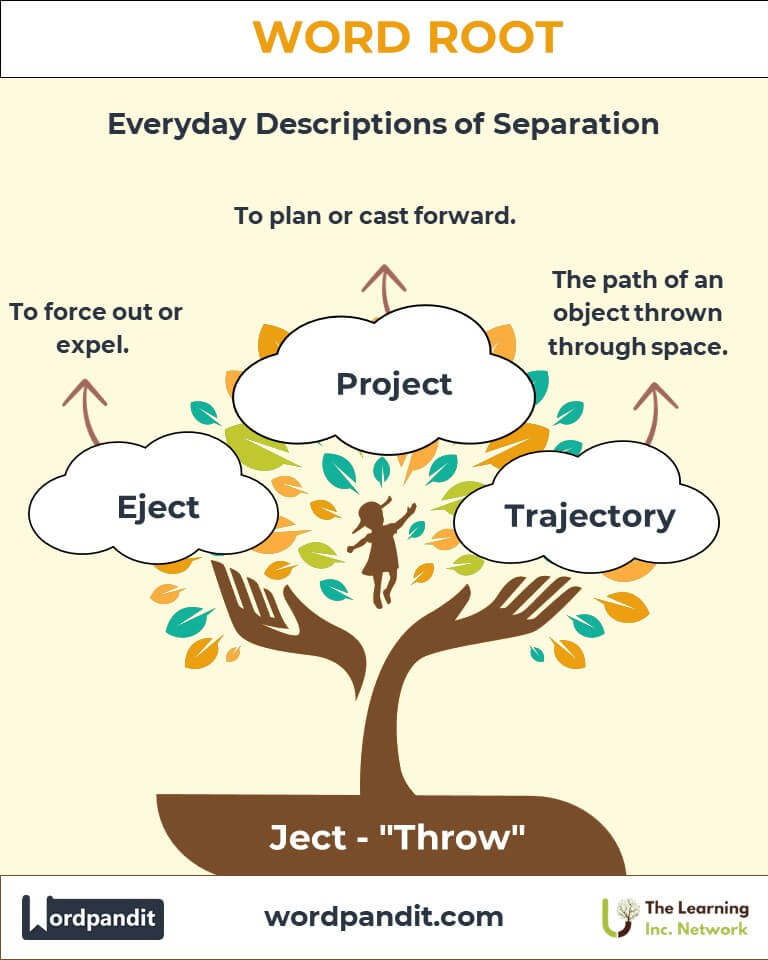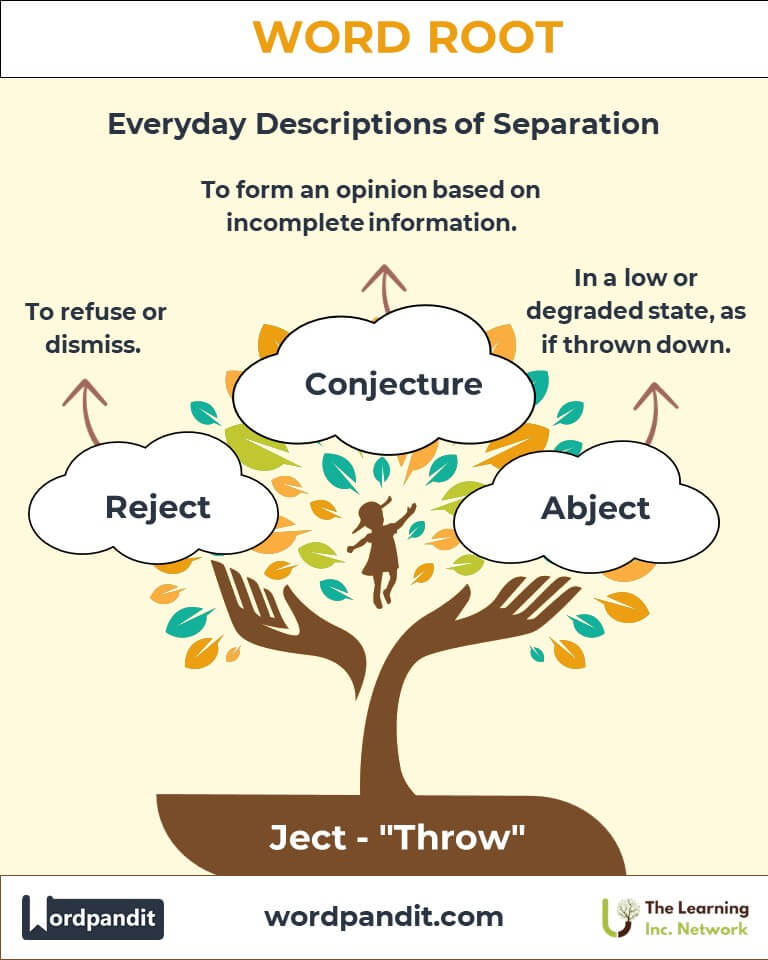
Table of Contents
- Introduction: The Essence of "Ject"
- Etymology and Historical Journey
- Mnemonic: Unlocking the Power of "Ject"
- Common "Ject"-Related Terms
- "Ject" Through Time
- "Ject" in Specialized Fields
- Illustrative Story: "Ject" in Action
- Cultural Significance of "Ject"
- The "Ject" Family Tree
- FAQs about the "Ject" Word Root
- Test Your Knowledge: "Ject" Mastery Quiz
- Conclusion: The Dynamic Legacy of "Ject"
Introduction: The Essence of "Ject"
Imagine propelling an idea forward or discarding an outdated concept; both actions hinge on the root "ject." Pronounced "jekt," this Latin root means "throw." Words like project (to plan or display) and reject (to discard) illustrate its dynamic applications in various contexts. From science to communication, "ject" captures the momentum of throwing things—be it ideas, objects, or emotions—into action or out of relevance.

Etymology and Historical Journey
The root "ject" originates from the Latin verb jacere, meaning "to throw." Over centuries, this root evolved through Middle English and Old French influences, integrating into English vocabulary. In ancient Rome, "ject" was associated with military actions like "ejecting" enemies or "projecting" strategies, eventually becoming symbolic of broader movements and ideas.
Mnemonic: Unlocking the Power of "Ject"
Picture a catapult launching a projectile across a field—this visual captures the core meaning of "ject" as "to throw."
Mnemonic Device: "Ject launches ideas like a catapult, projecting dreams or rejecting fears."
Common "Ject"-Related Terms
- Project (proh-ject)
- Definition: To plan or cast forward.
- Example: "She worked tirelessly to project her vision for the future."
- Reject (ree-ject)
- Definition: To refuse or dismiss.
- Example: "The committee decided to reject the proposal due to budget constraints."
- Eject (ee-ject)
- Definition: To force out or expel.
- Example: "The pilot had to eject from the malfunctioning aircraft."
- Inject (in-ject)
- Definition: To introduce or force into something, especially fluids or ideas.
- Example: "The doctor will inject the vaccine to provide immunity."
- Object (ob-ject)
- Definition: A thing thrown in focus or to oppose.
- Example: "He raised an objection during the trial to challenge the claim."
"Ject" Through Time
- Abject (Middle English): Derived from the Latin abjectus ("thrown down"), it once described humility but evolved to denote hopelessness or degradation.
- Example: "Living in abject poverty, the family sought community aid."
- Conjecture (Renaissance): Initially meaning "to throw together ideas," it became synonymous with educated guesses in intellectual discussions.
- Example: "His conjecture about the ancient ruins sparked further research."
"Ject" in Specialized Fields
Medicine
- Inject: Administering medication directly into the body.
- Example: "A nurse must inject insulin into diabetic patients daily."
Technology
- Eject: Safely removing hardware from a device.
- Example: "Always eject your USB drive to prevent data corruption."
Architecture and Design
- Project: Visualizing future structures or layouts.
- Example: "The architect projected a 3D model of the proposed building."
Illustrative Story: "Ject" in Action
Lucas, a budding entrepreneur, struggled to project confidence during his first investor pitch. Rejected multiple times, he learned to inject passion into his presentations. With perseverance, he projected success, eventually securing funding for his startup. His journey mirrored the dynamic power of "ject," showcasing resilience through rejection and triumph through projection.
Cultural Significance of "Ject"
"Ject" has deeply influenced culture, symbolizing both acceptance and refusal. From political rejections shaping history to projected aspirations driving innovation, it reflects human nature's duality—what we throw away and what we aim for. The Renaissance, in particular, celebrated "ject" roots in philosophical and scientific contexts, emphasizing projection of knowledge and rejection of ignorance.

The "Ject" Family Tree
Jac (Latin: throw)
- Adjacent: Lying next to or near, metaphorically "thrown close."
Traject (Latin: across throw)
- Trajectory: The path of an object thrown through space.
Mis (Latin: send)
- Mission: A task or journey "thrown" with purpose.

FAQs About the Ject Word Root
Q: What does the root "ject" mean?
A: The root "ject" comes from the Latin word jacere, meaning "to throw." It is the foundation for words that involve throwing, projecting, or moving something forward or outward, such as eject (throw out), project (throw forward), or reject (throw back).
Q: How is "ject" used in everyday life?
A: In daily life, "ject" words are used in various contexts:
- Project: To present a plan or idea, often used in business or school.
- Reject: To refuse or dismiss something, like declining an offer.
- Inject: To administer medicine through a needle, a common medical practice.
Q: What does "trajectory" mean, and how does it connect to "ject"?
A: The word "trajectory" refers to the path of an object in motion, especially one thrown or propelled. It combines the prefix "tra-" (across) with "ject" (throw), symbolizing the act of throwing something across a distance.
Q: What is the difference between "eject" and "reject"?
A:
- Eject: To force or throw something out, like ejecting a DVD from a player.
- Reject: To dismiss or refuse something, like rejecting a job offer.
Q: What is a "conjecture," and how is it related to "ject"?
A: A conjecture is an opinion or conclusion formed based on incomplete information. It derives from the idea of "throwing together" ideas to create a hypothesis, reflecting its etymological connection to "ject."
Test Your Knowledge: Ject Mastery Quiz
1. What does the root "ject" mean?
2. Which word means "to introduce into something"?
3. What describes the path of a moving object?
4. What does "reject" imply?
5. Which term is related to predictions or educated guesses?
Conclusion: The Dynamic Legacy of "Ject"
The root "Ject" embodies movement, transformation, and action. Whether propelling ideas forward or discarding outdated notions, it encapsulates life's dual nature of holding onto what serves us and letting go of what doesn't. Its versatility ensures its relevance across disciplines, making "Ject" a cornerstone of dynamic expression.














